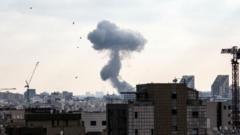In a startling development early yesterday, the U.S. military launched air and naval strikes on three Iranian nuclear sites, causing significant damage to the heavily fortified Fordo facility. The assaults come after President Trump hinted at potential regime change in Iran, escalating fears of a broadening crisis in the Middle East. Following the U.S. bombings, Israel conducted additional strikes, signaling a robust military response to perceived threats from Iran.
Escalation in the Middle East: U.S. Strikes Iran's Nuclear Facilities

Escalation in the Middle East: U.S. Strikes Iran's Nuclear Facilities
Amid rising tensions, U.S. military action in Iran raises concerns of a more dangerous conflict across the region.
The outcome of the strikes remains uncertain, particularly regarding Iran's capability to develop nuclear weapons and respond militarily. Notably, the U.N.’s nuclear oversight director indicated that Iran may have concealed its near-bomb-grade uranium before the assaults, rendering U.S. intelligence less effective in assessing potential counteractions.
Iranians reacted with shock and anger towards the U.S. actions, with Foreign Minister Abbas Araghchi proclaiming that the nation would "reserve all options" to protect its interests. There are indications of Iran-backed militias mobilizing for potential attacks on U.S. bases in Iraq and Syria, raising the stakes even further.
In light of such escalations, the likelihood of resuming diplomatic negotiations to resolve the ongoing conflict between Israel and Iran appears increasingly bleak. Trump's latest military decision underscores a clear ideological alignment with pro-Israel factions amidst a broader conflict, complicating prospects for peace.
As international responses pour in, calls for restraint echo across the globe, though reactions vary widely. Many Gulf nations express concern over potential Iranian retaliation, while Israel rejoices in the perceived success of U.S. interventions.
With both nations on high alert, this marks a crucial moment in international relations, as many wonder whether the U.S. is embroiled in a direct confrontation with Iran. The coming days will be pivotal in determining the future trajectory of this conflict.
Iranians reacted with shock and anger towards the U.S. actions, with Foreign Minister Abbas Araghchi proclaiming that the nation would "reserve all options" to protect its interests. There are indications of Iran-backed militias mobilizing for potential attacks on U.S. bases in Iraq and Syria, raising the stakes even further.
In light of such escalations, the likelihood of resuming diplomatic negotiations to resolve the ongoing conflict between Israel and Iran appears increasingly bleak. Trump's latest military decision underscores a clear ideological alignment with pro-Israel factions amidst a broader conflict, complicating prospects for peace.
As international responses pour in, calls for restraint echo across the globe, though reactions vary widely. Many Gulf nations express concern over potential Iranian retaliation, while Israel rejoices in the perceived success of U.S. interventions.
With both nations on high alert, this marks a crucial moment in international relations, as many wonder whether the U.S. is embroiled in a direct confrontation with Iran. The coming days will be pivotal in determining the future trajectory of this conflict.





















